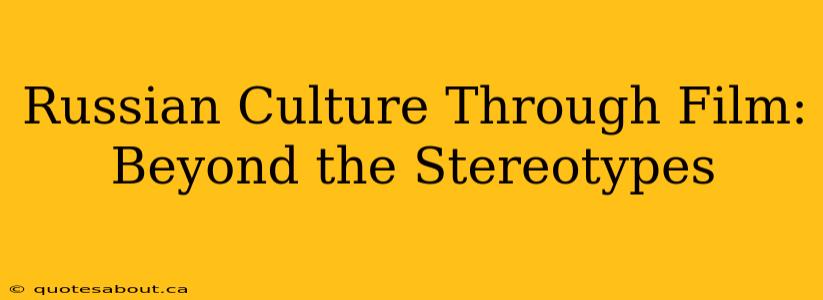Russian cinema offers a captivating window into a rich and complex culture, far beyond the common stereotypes often portrayed in Western media. From sweeping epics to intimate character studies, Russian films provide a nuanced exploration of history, society, and the human spirit. This article delves into the multifaceted portrayal of Russian culture in film, moving beyond simplistic narratives and revealing the depth and diversity of this cinematic landscape.
What are some of the common stereotypes about Russian culture depicted in film?
Common stereotypes often depict Russians as stoic, vodka-loving individuals, entangled in political intrigue or caught in the throes of a harsh, unforgiving winter. These portrayals frequently lack the subtlety and nuance required to accurately represent the richness and diversity of Russian society. Often, the focus is on exaggerated aspects of the culture, neglecting the everyday lives and complexities of the Russian people. For example, while vodka plays a role in Russian culture, it's often overemphasized in films to create a simplistic narrative of Russian identity.
How do Russian films challenge these stereotypes?
Many Russian films actively challenge these stereotypes by offering alternative perspectives. Films like "Leviathan" (2014) expose the corruption and societal struggles faced by ordinary citizens, humanizing characters often overlooked in simplistic narratives. "The Return" (2003) explores family dynamics and the emotional complexities of human relationships within a specific social context, providing a far more nuanced portrayal of Russian family life. Works by directors like Andrei Tarkovsky ("Stalker," "Solaris") transcend national boundaries entirely, focusing on universal themes of spirituality, alienation, and the human condition. These films invite viewers to look beyond the superficial and consider the underlying human experiences that unite, rather than divide, cultures.
What are some key themes explored in Russian cinema?
Russian cinema frequently explores themes of:
- History and its impact: Many films grapple with Russia's tumultuous past, examining the consequences of revolutions, wars, and political upheavals on individual lives and national identity.
- Social realism: A strong tradition of social realism in Russian cinema presents unflinching portrayals of social issues, poverty, and inequality.
- Spirituality and existentialism: Directors like Tarkovsky explore profound philosophical questions about the nature of existence, faith, and the search for meaning.
- Family and relationships: Family dynamics and interpersonal relationships are often central themes, revealing the complexities of human connection in various social contexts.
- The human condition: Beyond specific social or historical settings, many Russian films delve into universal themes of love, loss, hope, and despair.
What are some must-see Russian films to understand the culture better?
While many films could be included, some key examples to consider include:
- Andrei Tarkovsky's works: "Stalker," "Solaris," and "Andrei Rublev" offer profound explorations of spirituality and the human condition.
- Nikita Mikhalkov's films: "Burnt by the Sun" and "Siberiade" provide epic narratives about Russian history and family.
- Eldar Ryazanov's comedies: These films, such as "The Irony of Fate," offer witty social commentary and insights into everyday Russian life.
- Contemporary films: Look for works by directors like Andrey Zvyagintsev ("Leviathan," "Loveless") and Alexander Sokurov ("Faust," "Russian Ark") for modern perspectives.
How does Russian film differ from Western portrayals of its culture?
The primary difference lies in the depth and nuance. Western films often rely on stereotypes and simplistic narratives, frequently focusing on the exotic or the sensational. Russian cinema, particularly those works mentioned above, offers a far more complex and multifaceted portrayal, acknowledging the contradictions and complexities inherent within Russian society and culture. It's a cinema that often challenges viewers to engage with difficult themes and consider perspectives outside their own cultural framework.
Are there specific directors who excel at portraying Russian culture authentically?
Many directors have made significant contributions to authentically portraying Russian culture. Andrei Tarkovsky is known for his deeply philosophical and visually stunning films that transcend national boundaries. Nikita Mikhalkov masterfully depicts sweeping historical narratives and the intricacies of family relationships. Andrey Zvyagintsev's contemporary films present harsh but realistic portrayals of Russian society. Each director brings a unique perspective and style, contributing to the rich tapestry of Russian cinema.
By exploring the diverse and nuanced world of Russian film, we can move beyond tired stereotypes and gain a deeper appreciation for the richness and complexity of Russian culture. It's a cinematic journey that rewards the patient viewer with insights into the human experience, universally relevant themes, and a perspective often missing in mainstream Western cinema.

